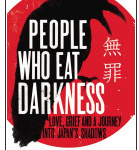 Japan is a country of great natural beauty, singular art, and an unending source of interest to many Westerners. But life there is very different from life in western cultures. “People Who Eat Darkness,” a compelling true story of crime, investigation, and punishment in Japan – and the concomitant grief and loss in the United Kingdom – underlines the significant differences in the criminal justice systems.
Japan is a country of great natural beauty, singular art, and an unending source of interest to many Westerners. But life there is very different from life in western cultures. “People Who Eat Darkness,” a compelling true story of crime, investigation, and punishment in Japan – and the concomitant grief and loss in the United Kingdom – underlines the significant differences in the criminal justice systems.
Lucie Blackman left school after completing her A levels. Instead of going to university she worked, first in a bank, and then as a British Airways flight attendant. She was tall, blonde, and meticulously well-groomed, but she was in debt. When a friend told her that she could make money easily, working in Japan as a hostess in a club catering to Japanese salarymen, she decided to go. After two months in Japan she disappeared.
Her father and sister went to look for her, and Lloyd Parry, the Tokyo Bureau Chief of The Times of London, was taken with Lucie’s story. And that of several other young Western women who had come forward with a story of waking up naked and ill after going out for a drink with a man. In the US, if someone were to come forward with that kind of story, the police would actively investigate – in fact, there’s a similar story being reported as I write. In Japan, the police seemed to ignore the reports. In 2000, though, Tony Blair, then the British Prime Minister, was in Tokyo for a summit meeting with the Japanese Prime Minister. The Blackmans were able to reach him; Blair’s public statements put pressure on the Japanese to increase their efforts to find Lucie.
Who were these young women? Who were the men they dated? And what is the culture that encourages the development of clubs where women are paid to converse with, and feign interest in, the male customers? Lloyd Parry does an excellent job describing the different paths that bring people to the clubs, the subtle distinctions between hostessing, topless dancing, and prostitution, and the appeal of the clubs to both sides in the transaction.
This is not just the story of a young woman’s disappearance, and the subsequent investigation, arrest and prosecution. It’s also an extended meditation on how we behave in public. For the Blackmans, there was a choice: hold press conferences and generally use the media to enlist the public’s help, or stay private, and work closely with the police. Either choice has risks and benefits, and Lloyd Parry shows how the consequences of the Blackmans’ choice were magnified by the cultural divide. Even on our side, there are expectations for behavior, and Lucie’s father, Tim, did not always follow them.
It’s in Lloyd Parry’s explorations of those expectations, and the real-life impact of tragedy on a family, that this exceptionally well-written book is the most sensitive and interesting. Lloyd Parry knows how to tell a story. In “People Who Eat Darkness” he also demonstrates the an unusual ability to find meaning behind the events he relates. Do you agree? Let us know in the comments.
Have a book you want me to know about? Email me at asbowie@gmail.com. I also blog about metrics here.
